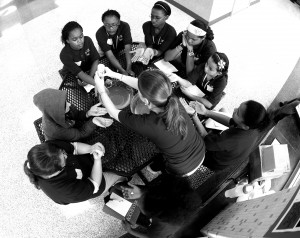The National Science Foundation (NSF) recently awarded UR’s Warner School of Education a $1.2 million grant for a program called Science STARS (Students Tackling Authentic & Relevant Science).
Developed by Warner School associate professor April Luehmann seven years ago, the program provides resources for hundreds of young women from minority groups and of low economic status in Rochester to partake in the field of science.
Equally benefiting from this program are the master’s degree students at the Warner School, especially those preparing to be science teachers. Through the program, the aspiring teachers were able to engage these young women in meaningful relationships around the development of long-term science investigation. The young women, in turn, helped the students develop as teachers.
“We chose to work with young women from an urban setting to actively combat well-documented trends of decreased student interest in science among middle school girls, as well as often unintended marginalization moves by many important people in these young women’s lives,” Luehmann said.
With science assuming an increasingly ubiquitous role in society — there are now science course requirements for many career paths — those who excel in science are perceived to have a wide range of skills. Luehmann raises the concern that young women today are bombarded with social messages about their position in society that are not only divergent from these useful identities, but are also counter-productive.
Hence, Science STARS targets young women at a critical time in their development: when they are building personal and social goals for their professional futures.
The NSF funding comes as a big boost to the program, allowing for a community stakeholder conference, systematic research endeavors and increased collaboration with other leading thinkers and advocates of youth empowerment nationally and internationally. The funding will also go to specific efforts under Science STARS, such as over-night camping retreat for Inquiry Intensive workshops at a local YMCA camp, which took off at Camp Cory in Penn Yann this year.
The program can now double in its duration, from 10 weeks in the fall to 20 weeks yearlong by adding on the experience of working with professional filmmakers to create a near-professional science documentary centered on the question, “What does Rochester need to know about my science?”
These student-made videos will be disseminated publicly, followed by a red carpet premier night for the East High School Science STARS at a local cinema. Additionally, they will be able to draw peer mentors of undergraduate women who are science majors at UR to participate in science alongside the youth.
Science STARS has achieved significant successes over the years, from an increased number of applicants each year to the program expanding to Lansing, Mich. and Seattle, Wash.
“Many stakeholders at East High — office staff, administrators, security personnel, teachers, janitorial staff and others — are aware of and incredibly supportive of the work of Science STARS,” Luehmann said. “One can walk through the large campus and see science questions and models on the windows and pictures and posters on the walls.”
Lim is a member of the class of 2014.



